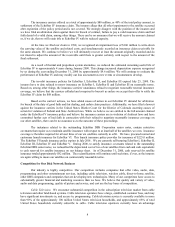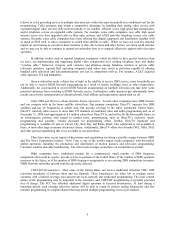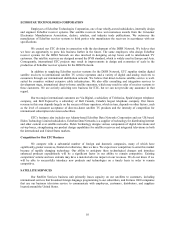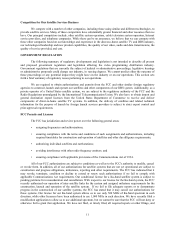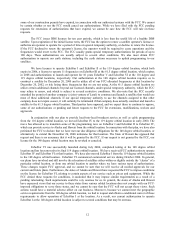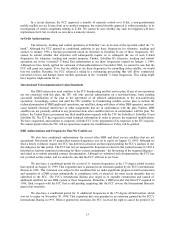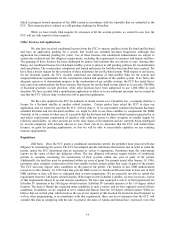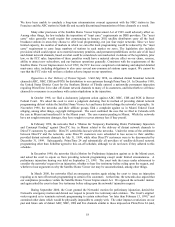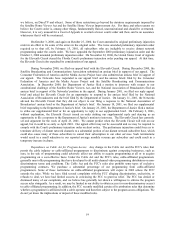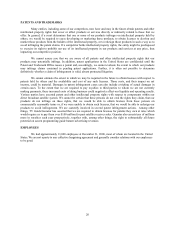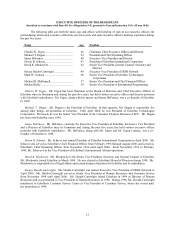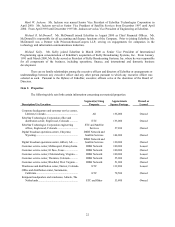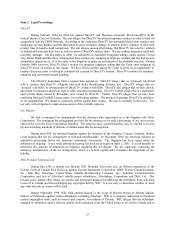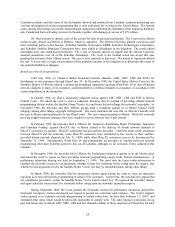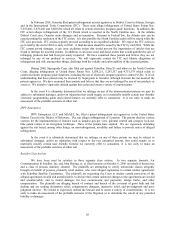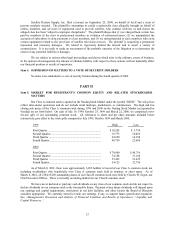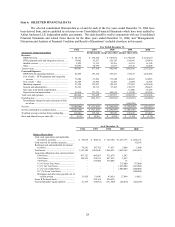Dish Network 2000 Annual Report Download - page 20
Download and view the complete annual report
Please find page 20 of the 2000 Dish Network annual report below. You can navigate through the pages in the report by either clicking on the pages listed below, or by using the keyword search tool below to find specific information within the annual report.18
We have been unable to conclude a long-term retransmission consent agreement with the NBC station in San
Francisco and the ABC station in Nashville and recently discontinued transmission of those channels as a result.
Many other provisions of the Satellite Home Viewer Improvement Act of 1999 could adversely affect us.
Among other things, the law includes the imposition of “must carry” requirements on DBS providers. The “must
carry” rules generally would require that commencing in January 2002 satellite distributors carry all the local
broadcast stations in areas they choose to offer local programming, not just four major networks. Since we have
limited capacity, the number of markets in which we can offer local programming would be reduced by the “must
carry” requirement to carry large numbers of stations in each market we serve. The legislation also includes
provisions which could expose us to material monetary penalties, and permanent prohibitions on the sale of all local
and distant network channels, based on what could be considered even inadvertent violations of the legislation, prior
law, or the FCC rules. Imposition of these penalties would have a material adverse effect on our churn, revenue,
ability to attract new subscribers, and our business operations generally. Consistent with the requirements of the
Satellite Home Viewer Improvement Act of 1999, the FCC has now completed a rulemaking and adopted detailed
must-carry rules, including obligations to also carry several non-commercial stations upon request. We cannot be
sure that the FCC rules will not have a further adverse impact on our operations.
Opposition to Our Delivery of Distant Signals. Until July 1998, we obtained distant broadcast network
channels (ABC, NBC, CBS and FOX) for distribution to our customers through PrimeTime 24. In December 1998,
the United States District Court for the Southern District of Florida entered a nationwide permanent injunction
requiring PrimeTime 24 to shut off distant network channels to many of its customers, and henceforth to sell those
channels to consumers in accordance with certain stipulations in the injunction.
In October 1998, we filed a declaratory judgment action against ABC, NBC, CBS and FOX in Denver
Federal Court. We asked the court to enter a judgment declaring that its method of providing distant network
programming did not violate the Satellite Home Viewer Act and hence did not infringe the networks’ copyrights. In
November 1998, the networks and their affiliate groups filed a complaint against us in Miami Federal Court
alleging, among other things, copyright infringement. The court combined the case that we filed in Colorado with
the case in Miami and transferred it to the Miami court. The case remains pending in Miami. While the networks
have not sought monetary damages, they have sought to recover attorney fees if they prevail.
In February 1999, the networks filed a “Motion for Temporary Restraining Order, Preliminary Injunction
and Contempt Finding” against DirecTV, Inc. in Miami related to the delivery of distant network channels to
DirecTV customers by satellite. DirecTV settled this lawsuit with the networks. Under the terms of the settlement
between DirecTV and the networks, some DirecTV customers were scheduled to lose access to their satellite-
provided distant network channels by July 31, 1999, while other DirecTV customers were to be disconnected by
December 31, 1999. Subsequently, PrimeTime 24 and substantially all providers of satellite-delivered network
programming other than EchoStar agreed to this cut-off schedule, although we do not know if they adhered to this
schedule.
In December 1998, the networks filed a Motion for Preliminary Injunction against us in the Miami court,
and asked the court to enjoin us from providing network programming except under limited circumstances. A
preliminary injunction hearing was held on September 21, 1999. The court took the issues under advisement to
consider the networks’ request for an injunction, whether to hear live testimony before ruling upon the request, and
whether to hear argument on why the Satellite Home Viewer Act may be unconstitutional, among other things.
In March 2000, the networks filed an emergency motion again asking the court to issue an injunction
requiring us to turn off network programming to certain of its customers. At that time, the networks also argued that
our compliance procedures violate the Satellite Home Viewer Improvement Act. We opposed the networks’ motion
and again asked the court to hear live testimony before ruling upon the networks’ injunction request.
During September 2000, the Court granted the Networks’ motion for preliminary injunction, denied the
Network’s emergency motion and denied our request to present live testimony and evidence. The Court’s original
order required us to terminate network programming to certain subscribers “no later than February 15, 1999,” and
contained other dates which would be physically impossible to comply with. The order imposes restrictions on our
past and future sale of distant ABC, NBC, CBS and Fox channels similar to those imposed on PrimeTime 24 (and,


